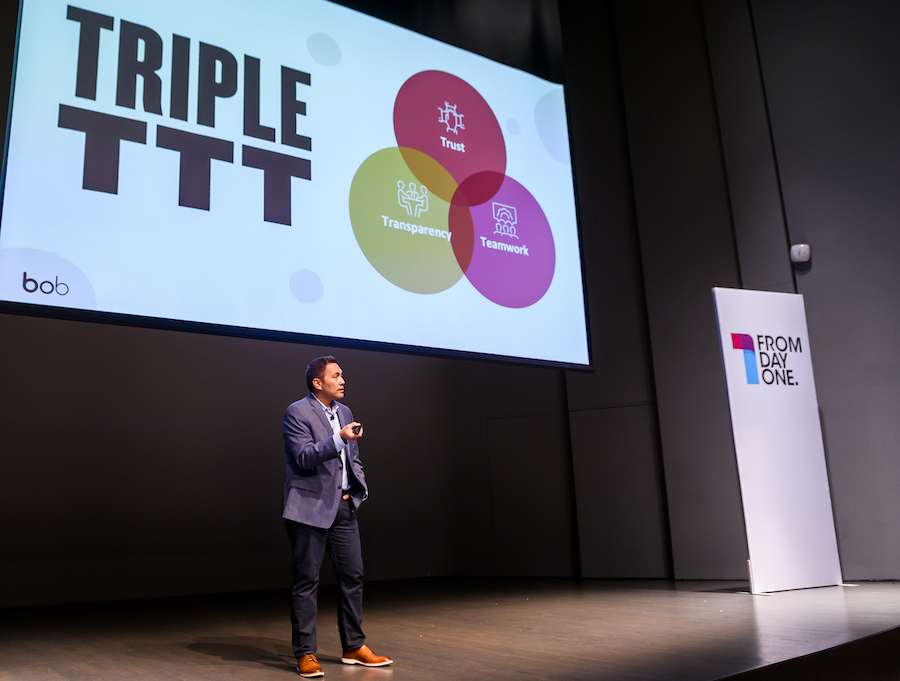Work Is Changing. Is Your Company Culture Keeping Up?


A strong company culture built on shared values is essential to the success of your team but difficult to define, let alone cultivate, says Mike Kaupe, global director of sales engineering for HiBob, a provider of HR platforms and analytics. Companies first need to understand why a healthy culture is so important, then they must go about the very hard work of creating it.
Kaupe spoke during a Thought Leadership Spotlight at From Day One’s recent live conference in Chicago, a city known for its skyscrapers, blues music and deep dish pizza. While those elements have helped define the city’s culture, it’s richer and more varied than that, said Kaupe, who was immersed in different cultures as a child growing up in a U.S. Army family.
“Culture is an accumulation of relationships that you cannot copy, and you cannot fake. You can't do it. It's unique to every business, every organization,” he told the audience.
For companies striving to build a strong culture, the changing nature of work is making the challenge that much harder, even as it fosters creativity. Your employees may work from home, or in hybrid, flexible or dynamic arrangements. Communication is often through digital collaboration. Engagement is now a tool for shaping culture.
Like that gooey deep dish pizza, the layers pile on. Mass layoffs, hiring freezes, the uncertain economy and slowing corporate growth, or none at all, have been added to the mix. Even companies that have been around for many years are re-evaluating their values in the face of these enormous challenges.
Amid all the shifting variables, is it possible for an organization to maintain the values that its employees hold dear? “It's not easy. It's very difficult, and very, very challenging,” said Kaupe. “But it's not impossible.”
Start By Being Honest
The first step is to be transparent, Kaupe advised. Employees may have different perceptions of their role in the company’s vision. At HiBob, sharing the context in which decisions are made has helped to bring employees on board with those decisions and “gave us permission to continue the mission,” he said.
Embracing transparency has meant being inclusive, which has been key to earning employees’ trust, he said. The company looked for policies and procedures that created experiences of exclusion and removed them.
“This transparency helped to build the culture of trust that we wanted, and that we needed, across the business,” Kaupe said.

What followed next was greater collaboration, as people felt empowered to speak their minds, share their thoughts and be vulnerable. “When employees perceive that their organizations are transparent, they engage better,” Kaupe said. “They have better job satisfaction compared to employees who believe that their companies are not being transparent. They believe that their companies may be hiding something. Why? Because there's a lack of trust.”
At HiBob, because a culture of trust was developed, groups and teams started giving each other feedback on how well they were doing, what they were doing wrong, and how they could improve. The process led to a recognition that praising group achievements, and not just giving individual accolades, could help build trust. “This fostered some really cool group cohesion,” said Kaupe.
“We've learned that trust, transparency and teamwork are the keys to putting your people first. It sounds like a no-brainer. But this is really, really difficult,” he stressed.
The High Cost of Lost Trust
Kaupe argues that leaders who push their workers back into the office because they think people will be more productive in the workplace environment are directly at odds with employees who believe they are more productive at home. The cost is “quiet quitting,” in which employees may spend months getting paid for doing as little work as possible.
Similarly, organizations that use so-called tattleware installed on computers to monitor their employees who work from home pay a price in lost trust. It’s a big cost to pay for that control, he said.
“Cultivating culture must start with knowing what your employees really, truly value,” Kaupe said.
HiBob has not been immune to the economic uncertainties affecting companies around the globe. As a result, said Kaupe, his team has a different perspective about work, greater insight and more empathy for what its customers are experiencing. The lesson learned is, “we grow through what we go through,” he said.
Editor's note: From Day One thanks our partner, HiBob, for sponsoring this thought leadership spotlight.
Susan Kelly is a business journalist based in Chicago.
The From Day One Newsletter is a monthly roundup of articles, features, and editorials on innovative ways for companies to forge stronger relationships with their employees, customers, and communities.